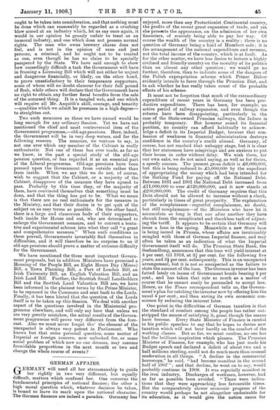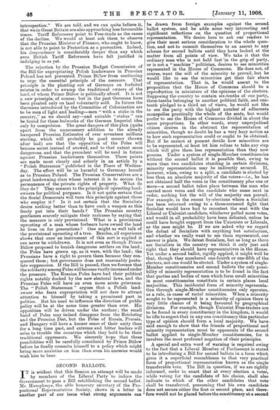GERMAN AFFAIRS.
GERMANY will need all her statesmanship to guide her rightly in two very different, but equally difficult, matters which confront her. One concerns the fundamental principles of national finance; the other a high moral question which, whatever decision be taken, is bound to leave its mark upon the national character. The German finances are indeed a paradox. Germany has enjoyed, more than any Protectionist Continental country, the profits of the recent great expansion of trade, and yet she presents the appearance, on the admission of her own financiers, of scarcely being able to pay her way. Of course the wealth of the country is a reality ; there is no question of Germany being a kind of Humbert safe ; it is the arrangement of the national expenditure and revenue, not the total income of the country, which is at fault. As for the other matter, we have less desire to lecture a highly civilised and friendly country on the morality of its politics than on almost any other question ; we would go no further, therefore, than to indicate some of the dangers of the Polish expropriation scheme which Prince Billow evidently intends to force through the Prussian Diet, and to ask whether he has really taken count of the probable effects of his.scheme.
It must not be forgotten that much of the extraordinary expenditure of recent years in Germany has been pro- ductive expenditure. There has been, for example, an active period of railway expansion, and even though the returns have been disappointing, particularly in the case of the State-owned Prussian railways, the failure is probably temporary. But however sound its financial position, no country can afford habitually to acknow- ledge a deficit in its Imperial Budget, because that con- fession of weakness in financial administration destroys confidence in the country's credit abroad. Germany, of course, has not reached that unhappy stage, but it is clear that her statesmen have misgivings and are anxious to put their house in order without delay. We wish them, for our own sake, we do not mind saying, as well as for theirs, a speedy success. The present gross deficit is £6,000,000, but this is being reduced to £5,000,000 by the expedient of appropriating the money which had been intended for the Sinking Fund for paying off the National Debt. Between 1881 and 1901 the National Debt increased from £11,000,000 to over £120,000,000, and it now stands at £200,000,000. The credit of Germany requires that this Debt should not be allowed to increase without a check, particularly in times of great prosperity. The explanation of the complaisance —regretful complaisance, no doubt, but still complaisance—of the Ministers who have let it accumulate so long is that one after another they have shrunk from the complicated and thankless task of adjust- ing the tariff. It appears to be certain that Germany will issue a loan in the spring. Meanwhile a new State loan is being issued in Prussia, whose affairs are inextricably mingled with those of German Imperial finance, and may often be taken as an indication of what the Imperial Government itself will do. The Prussian State Bank, the Seehandlung, announces that this loan will yield interest at 4 per cent. till 1918, at 31- per cent. for the following five years, and 3i per cent. subsequently. This is an unexpected arrangement, but it is not so unexpected as the failure to state the amount of the loan. The German investor has been fatted lately on issues of Government bonds bearing 4 per cent., and has taken that rate so much as a matter of course that be cannot easily be persuaded to accept less. Hence, as the Times correspondent tells us, the Govern- ment's plan for catching the investor now by offering him the usual 4 per cent., and then saving its own economic con- science by reducing the interest later.
One point in the difficulties of German taxation is that the standard of comfort among the people has rather out- stripped the means of satisfying it, great though the means have become. Every State Minister of Finance is careful in his public speeches to say that he hopes to devise new taxation which will not bear hardly on the comfort of the working classes. But so far, we must confess, no one has had the brilliant inspiration which pleases. The Prussian Minister of Finance, for example, who has just made his Budget speech and declared a deficit of about two and a half millions sterling, could not do much more than counsel moderation in all things. "A decline in the commercial horoscope," he said, "had become manifest in the second half of 1907 " ; and that decline, he went on to say, would probably continue in 1908. It was especially manifest in the iron industry. Discharges of workmen, however, had as far as possible been avoided. "There were indica- tions that they were approaching less favourable times. But the comparatively slower economic progress of the country would perhaps be not altogether undesirable for its education, as it would give the nation cause for introspection." We are told, and we can quite believe it, that we in Great Britain are also approaching less favourable times. Tariff Reformers point to Free-trade as the cause of the decline. We would at least ask them to observe that the Prussian Minister of Finance, who ought to know, is not able to point to Protection as a preventive. Indeed, his despondency is considerably deeper than any which even British Tariff Reformers have felt justified in indulging in as yet.
The rejection by the Prussian Budget Commission of the Bill for expropriating Polish landowners in Prussian Poland has not prevented Prince Billow from continuing to urge the essential principle of the measure. That priaciple is the planting out of Germans on forfeited estates in order to swamp the traditional owners of the land, of whom Prince Billow is politically afraid. It is not a new principle, of course; but in the past Germans have been planted only on laud voluntarily sold. In future the Germans introduced by the Committee of Colonisation are to be men of light and leading—men "with a stake in the country," as we should say—and suitable " stakes " can be found for these bulwarks of the German Imperial idea only by compulsion. The great dangers of this plan (quite apart from the unnecessary addition to the already hampered Prussian Estimates of over seventeen millions sterling, which will probably be good money thrown after bad) are that the opposition of the Poles will become secret instead of avowed, and to that extent more dangerous, and that the precedent will be used in future against Prussian landowners themselves. These points are made most clearly and soberly in an article by a "Polish Statesman" published in the Times of Wednes- day. The effect will be as harmful to Germany herself as to Prussian Poland. The Prussian Conservatives are a great landowning class whose interest it is to secure the permanence of the private rights of property. What do they do ? They consent to the principle of uprooting land- owners for political purposes. Is it not quite certain that the Social Democrats will turn this principle against those who employ it ? Is it not certain that the Socialists desire nothing better than to have such a weapon as this freely put into their hands ? The Prussian country gentlemen scarcely mitigate their rashness by saying that .0. the measure is only provisional. What is a provisional uprooting of a man whose forbears have owned the land he lives on for generations ? One might as well talk of the provisional uprooting of a tree. Besides, all experience shows that once an instrument of this sort is applied it can never be withdrawn. It is not even as though Prince Billow proposed to banish dangerous settlers on the land; the Poles have grown up, as it were, with the land ; the Prussians have a right to govern them because they con- quered them ; but governance does not reasonably postu- late suppression. If the Bill is passed, then we foresee that the solidarity among Poles will become vastly increased under the pressure. The Russian Poles have had their political rights notably docked by the new electoral laws, and the Prussian Poles will have an even more acute grievance. The "Polish Statesman" argues that a Polish land- owner who fears expropriation will not dare to attract attention to himself by taking a prominent part in politics. But his need to influence the direction of public policy will be at the same time greater than ever. His opposition will be driven under the surface ; the small band of Poles may indeed disappear from the Reichstag and the Prussian Diet, but the Poles of Russia, Prussia, and Hungary will have a keener sense of their unity than for a long time past, and extreme and bitter leaders will arise to trouble the countries which they hold to be their traditional oppressors. We sincerely hope that these possibilities will be carefully considered by Prince Billow before he finally commits himself to a policy which might bring more anxieties on him than even his enemies would wish him to bear.











































 Previous page
Previous page